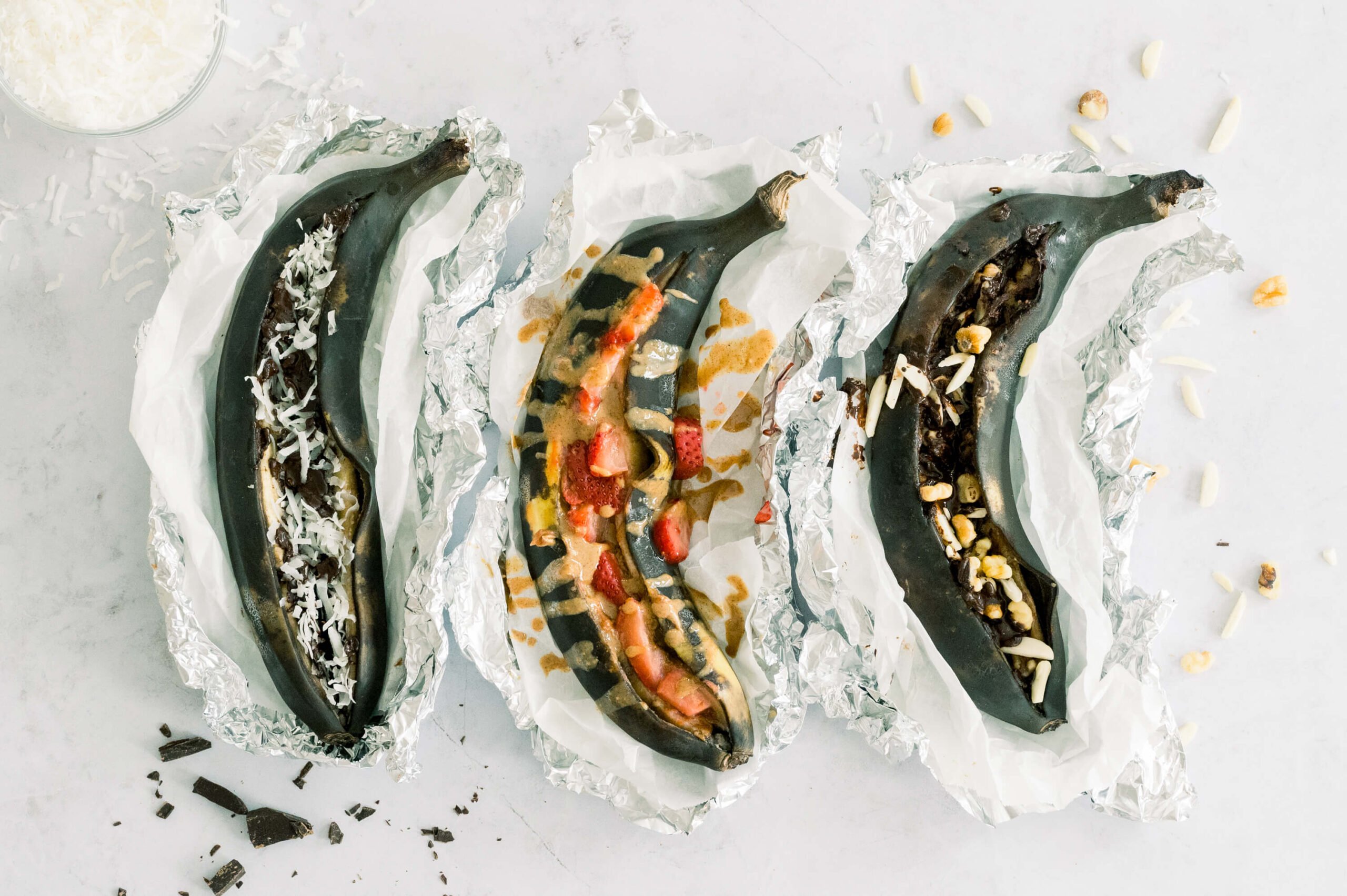Like all whole fruit, bananas can be part of a healthy PCOS diet. But it pays to know the pros and cons of eating them. You’re also better off with a few hacks for minimizing the impact on blood glucose levels.
Here’s what I share on this topic during my free 30-Day PCOS Diet challenge.
Pros & Cons of Bananas for PCOS
Like most fruits for PCOS, bananas are a good source of vitamins, minerals, and fiber.
They’re most well-known for being a rich source of potassium. But it’s worth noting that potassium is available in many different foods.
The fiber in bananas is great for gut health. This is especially important for women with PCOS as I explain in my article on how to lose weight with PCOS. But again, a lot of foods contain fiber.
The main argument for why bananas are bad for PCOS is that they contain a lot of sugar. Yes, you get three grams of fiber in a banana, but you also get about 19 grams of sugar. Sugar is the most important food to avoid with PCOS. Fortunately, the sugar found in a banana isn’t as unhealthy as the same quantity of table sugar. That’s because the fiber content of whole fruit changes the way fruit sugars are metabolized [1-3].
But a banana on its own is still likely to cause adverse changes in blood glucose levels. The extent of this problem varies for everyone. But high blood glucose levels promote insulin resistance. And insulin resistance is one of the underlying causes of all PCOS symptoms [4-6].
The following tips when eating bananas mitigate this hazard.
Tips for Enjoying Bananas with PCOS
- Follow a low-sugar, PCOS diet. Download this free 3-Day Meal Plan for a worked example.
- Eat bananas with protein and fat. This helps to lower the impact on blood glucose levels. For example, eating PCOS-friendly yogurt with a banana lowers the glycemic response.
- Limit serving sizes. One medium-sized banana is about as much as you’d want in a day.
- Only eat fresh or frozen whole bananas. Avoid dried bananas as the sugar content is much higher.
PCOS-Friendly Banana Recipes
This PCOS banana bread recipe puts the above ideas into practice. It’s a long-time favorite in my free 30-Day PCOS Diet Challenge.
The best thing about bananas is their value as a sugar substitute. For example, they make an excellent natural sweetener in PCOS smoothies or PCOS dessert recipes.
If you’re struggling with sugar cravings, then recipes like these PCOS banana boats are going to be much better for you than candy or ice cream.

Ingredients
- 1.8 oz (50 g) Dark chocolate (85% cacao)
- 4 tbsp Shredded coconut
- 2 Bananas
Directions
- Preheat your oven to 300°F (150°C).
- Cut a slit lengthwise through each banana, making sure you only cut through one side of the peel.
- Fill each banana with equal amounts of chocolate and coconut.
- Wrap each banana up in aluminum foil and place it on a baking sheet.
- Cook for 20-25 minutes, until the skin turns black.
- Serve hot. One for you, and one for your nearest and dearest.
The Bottom Line
There are pros and cons to including bananas within your PCOS diet. Bananas contain fiber and healthy micronutrients. But you can get these nutrients from other foods too. Bananas contain sugar, but that’s not necessarily a show-stopper. The key thing to consider is how bananas impact blood glucose levels. This depends on your insulin sensitivity but also on how you choose to enjoy this fruit.
During my free 30-Day PCOS Diet Challenge, people see the benefits of a PCOS-friendly diet for themselves. In this context, bananas can be a helpful food for satisfying cravings and learning to enjoy a low-sugar lifestyle.
Author
As a Nutritionist, I’m continuing my mission to help women like you, beat PCOS. Evidence-based diet and lifestyle interventions helped me overcome five years of infertility. I fell pregnant naturally after multiple failed IVF cycles. Along the way, my other PCOS symptoms went away too. This experience taught me how to combine the latest science with a pragmatic approach to habit change. I’ve now helped thousands of other women achieve life-changing results, and I love for you to be the next PCOS success story. Learn more about me and what I do here.
References
1Jaffe, R., Chapter 4 – Diabetes as an Immune Dysfunction Syndrome, in Bioactive Food as Dietary Interventions for Diabetes, R.R. Watson and V.R. Preedy, Editors. 2013, Academic Press: San Diego. p. 41-52.
2Beisner, J., et al., Fructose-Induced Intestinal Microbiota Shift Following Two Types of Short-Term High-Fructose Dietary Phases. Nutrients, 2020. 12(11).
3Monro, J., et al., Dietary Fibre and Organic Acids in Kiwifruit Suppress Glycaemic Response Equally by Delaying Absorption-A Randomised Crossover Human Trial with Parallel Analysis of (13)C-Acetate Uptake. Nutrients, 2022. 14(15).
4Barrea, L., et al., Source and amount of carbohydrate in the diet and inflammation in women with polycystic ovary syndrome. Nutr Res Rev, 2018. 31(2): p. 291-301.
5Carvalho, L.M.L., et al., Polycystic Ovary Syndrome as a systemic disease with multiple molecular pathways: a narrative review. Endocr Regul, 2018. 52(4): p. 208-221.
6Wang, J., et al., Hyperandrogenemia and insulin resistance: The chief culprit of polycystic ovary syndrome. Life Sciences, 2019. 236.
As a Nutritionist, I’m continuing my mission to help women like you, beat PCOS. Evidence-based diet and lifestyle interventions helped me overcome five years of infertility. I fell pregnant naturally after multiple failed IVF cycles. Along the way, my other PCOS symptoms went away too. This experience taught me how to combine the latest science with a pragmatic approach to habit change. I’ve now helped thousands of other women achieve life-changing results, and I love for you to be the next PCOS success story. Learn more about me and what I do here.



